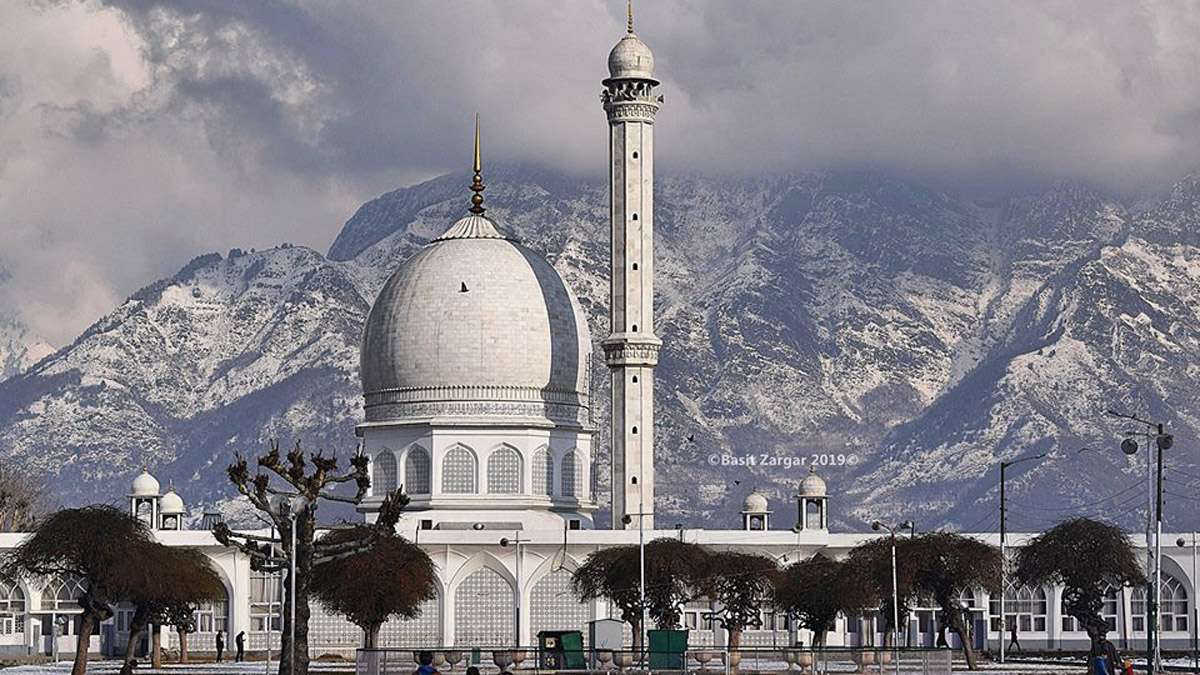Hazratbal Shrine, also known as Dargah Sharif, is regarded as the holiest Muslim shrine in Kashmir. This famous mosque is located 8 km away from the city centre, on the bank of Dal Lake in Hazratbal, Srinagar in the state of Jammu and Kashmir, India. The name of this mosque is derived from the Persian word ‘Hazrat’ which means ‘respected’ and the Kashmiri word ‘bal’ which means ‘place’. This shrine has an intriguing history that dates back to the 17th century. It contains a relic Moi-e-Muqqadas, the sacred hair of the beard of Prophet Muhammad.
Today’s location of the Hazratbal Mosque, was originally the site of Ishrat Mahal (Pleasure House) and a garden. They were built in 1623 by a Mughal Subedar, Sadiq Khan. In 1634, when Shah Jahan visited the place, he ordered to convert it into a prayer hall.
Who Built the Hazratbal Mosque?
Inayat Begum, the daughter of Khwaja Nur-ud-Din Eshai, a rich Kashmiri businessman, established Hazratbal mosque, when she became the custodian of the holy relic that would be preserved in this shrine. There’s an interesting story of how the relic was handed down to her.
In 1635, at the time when the Mughal empire was expanding in India, Syed Abdullah Madani, a descendant of Muhammad, left Medina and moved to Bijapur in South India. That time, he first brought the relic to Kashmir. When he died, the relic came to his son Syed Hameed. Due to the Mughal conquests in his region, Hameed felt unable to preserve the relic and hence transferred it to Khwaja Nur-ud-Din Eshai.
When the Mughal emperor Aurangzeb got to know of this relic, he seized it and shifted it to the shrine of Mu’in al-Din Chishti, a Sufi mystic in Ajmer and put Eshai in prison. However, after 9 days, Aurangzeb had a dream in which Muhammad asked him to take the relic to Kashmir. Then, Aurangzeb had the relic returned to Eshai so that he would get it to Kashmir. Since Eshai had died during imprisonment, by 1700, his body and the Moi-e-Muqaddas were brought to Kashmir. There the relic was given to Eshai’s daughter, Inayat Begum, who would later construct the Hazratbal mosque.
From that time, the male successors of Inayat Begum have been taking care of the relic at the shrine. These descendants belong to the Banday family. As of 2019, Manzoor Ahmad Banday, Ishaq Banday and Mohiuddin Banday are the custodians of the holy relic. On important Islamic holidays, the relic is put up for display to general public.
Theft of the Holy Relic from Hazratbal Shrine
In December 1963, the Moi-e-Muqqadas is said to have disappeared from the shrine. There were several protests across the state and communal riots in West Bengal and East Pakistan (today’s Bangladesh). Around 200,000 refugees entered India during that time. Pt Jawaharlal Nehru, the Prime Minister of India then, sent a CBI team to Jammu and Kashmir to investigate the issue, and the relic was recovered in January 1964.
Architecture of Hazratbal Shrine
The Hazratbal mosque is architecturally unique and one of the most visited places in Srinagar. Almost 11 years were required to complete the construction of this shrine. It was started in 1968 and completed by 1979.
The architectural style of the Hazratbal Masjid can be described as Islamic. It is built in white marble. It has a large white dome and tall minarets on the sides. The site is also used as a mosque to conduct prayers that are attended by thousands of Muslims. Its dome and minaret have an influence of Mughal architecture, while the shrine is influenced by the Kashmiri architecture. It is the only domed mosque in Srinagar.
The Hazratbal shrine provides stunning views of the Dal Lake and the surrounding mountains. The beautiful Nishat Mughal Garden is located at its entrance. This mosque in Srinagar is famed for its architectural beauty and mysterious history. Most importantly, it is an epitome of the devotion of Muslims towards Prophet Muhammad.

